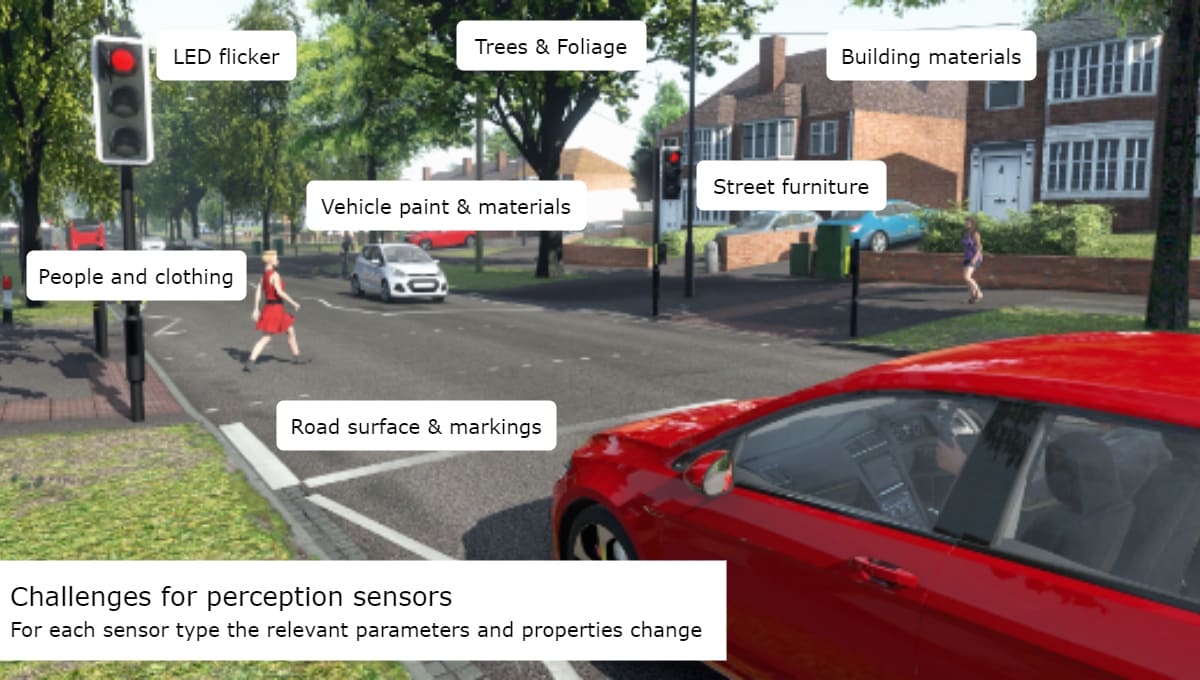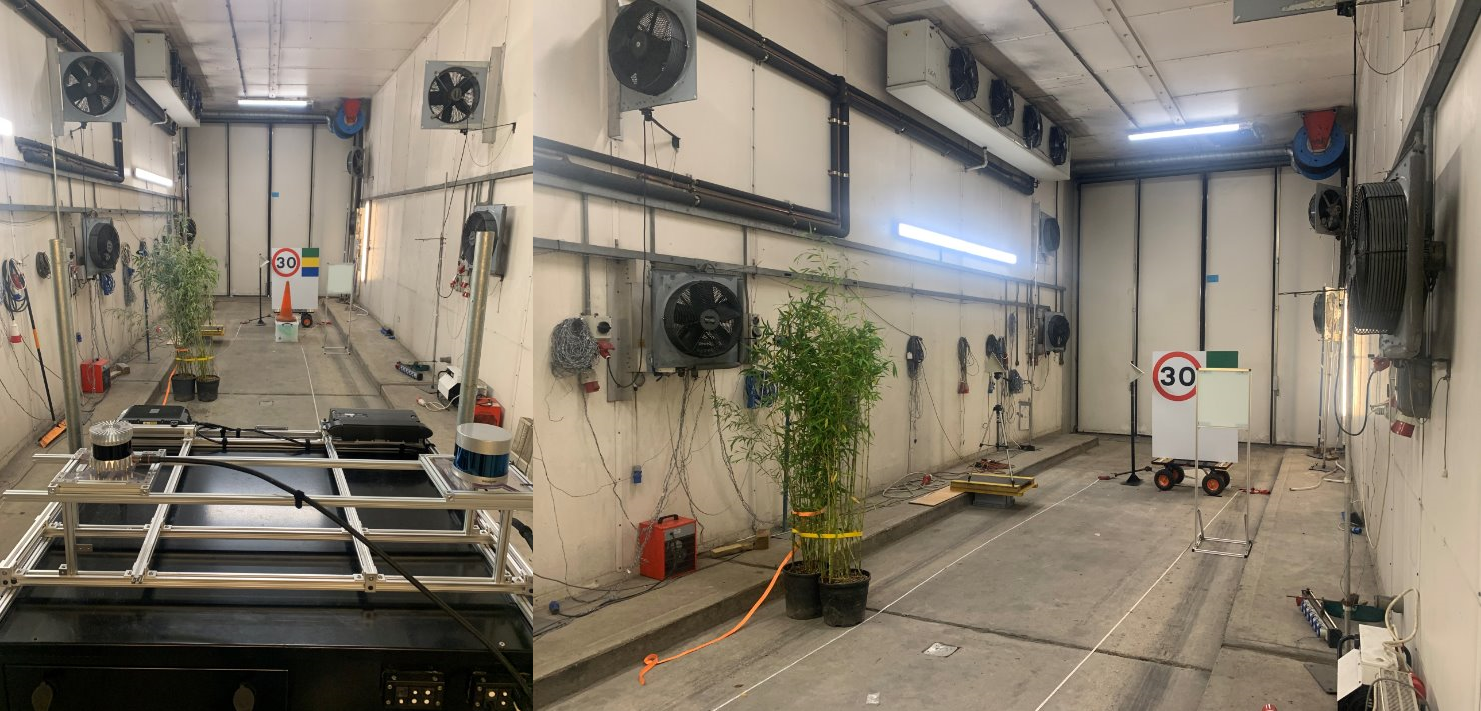Modelling, Simulation and Testing of automotive perception sensors
Sim4CAMSens is a CCAV funded project working on methods to quantify and simulate camera, radar and lidar sensor performance under all conditions.

Introducing the Sim4CAMSens project
In a rapidly evolving automotive landscape, the promise of autonomous vehicles (AVs) heralds a new era of mobility characterised by efficiency, lowered operational costs, and enhanced safety. Significant investments are being funnelled into the development and deployment of AVs, with a critical emphasis on ensuring their safety to meet regulatory satisfaction. At the heart of this venture lies the indispensable role of simulation in the development and safety assurance of AVs, especially given the vast array of sensor types and the numerous factors affecting sensor performance. The challenges extend to the massive and diverse spectrum of training data required, and the vital need to establish the credibility of simulations. The Sim4CAMSens project seeks to address these challenges by developing and maturing a modelling and simulation supply chain, specifically for perception sensor development and testing.

Challenges for perception sensors – For each sensor type the relevant parameters and properties change
The Sim4CAMSens project is a collaborative effort of innovation aimed at nurturing the simulation, modelling, and physical testing ecosystem for Connected and Automated Mobility (CAM) perception sensor and systems developers. The project endeavours to construct a robust supply chain to elevate the quality of modelling, simulation, test, and characterisation capability. This initiative is envisioned to accelerate and de-risk the design, development, validation, and utilisation of perception sensors and the algorithms crucial for automated driving functions. By forging clear links between tools, methodologies, standards, and safety cases, Sim4CAMSens is setting a course towards state-of-the-art modelling and simulation environments. These environments are anticipated to generate synthetic training data of requisite quality for training the Artificial Intelligence (AI) systems employed in AVs.
The collaborative spirit of Sim4CAMSens is manifested in its assembly of an expert, world-class consortium of partners dedicated to fostering an emerging perception sensors and systems industry. The project is led by Claytex and includes rFpro, Oxford RF, Syselek, NPL, WMG, Compound Semiconductor Applications Catapult and AESIN. It is supported by funding from the UK’s Centre for Connected and Autonomous Vehicles as part of their Commercialising CAM programme.
The three key goals for the project are:
- Quantify and simulate the perception sensors under all conditions to enable sensor suppliers to demonstrate the capabilities of their devices and to enable ADS developers to establish a robust process to compare competing devices. The sensor evaluation framework will also support the development and validation of sensor models.
- Enhance synthetic training data by improving perception sensor models. Given the challenges associated with collecting enough real-world training data the project will develop high-fidelity sensor models that include the same noise factors as the real devices.
- Propose a framework for simulation credibility and AV safety to the regulators. This is crucial to unlock the path to type approval and enable AV’s to be deployed safely on the public roads.
At the core of the Sim4CAMSens project lies a rigorous approach to the testing of perception sensors to be able to measure and quantify their performance under a wide range of test conditions. This involves both lab-based and field-based test work to identify and quantify the noise factors that affect sensor performance. Throughout the project, different test campaigns will investigate various factors that affect perception sensor performance covering weather, in particular snow, material properties and other environmental factors. In our next blog post we will introduce the winter test campaign that has been running since 1st January 2024 which aims to collect data from a wide range of perception sensors to be able to understand how their performance changes in winter conditions.
The journey of Sim4CAMSens reflects a concerted effort to navigate the complexities and potential of the autonomous landscape, fostering a cooperative relationship between simulation developers, sensor developers and formalising the test methodologies and frameworks that are required. This venture embodies the essence of collaborative innovation, driving the industry closer to realising the promise of an autonomous future. We see this as the start of the journey to grow a relevant and competitive modelling & simulation community and supply chain which will work together in the years to come.
Please get in touch if you have any questions or have got a topic in mind that you would like us to write about. You can submit your questions / topics via: Tech Blog Questions / Topic Suggestion
Project Updates
All the latest news, updates and information from our project partners.
CAV Catalogue – a comprehensive online listing for automated vehicles
The unique CAV Catalogue, has recently been updated, now offering a more comprehensive global directory of all L4 Automated Vehicles ...
Evaluating the impact of temperature and ice accumulation for lidar
Following on from last weeks post on Evaluating the impact of temperature and ice accumulation for radar, we will now ...
Evaluating the impact of temperature and ice accumulation for radar
During our first winter testing campaign (January to March 2024), we noticed some uncertainties in the results, which we suspected ...



